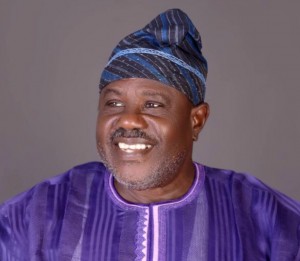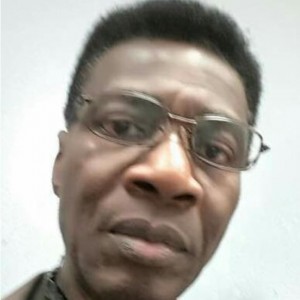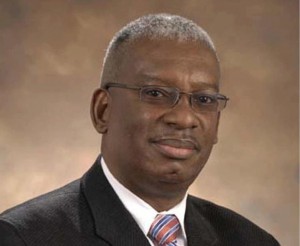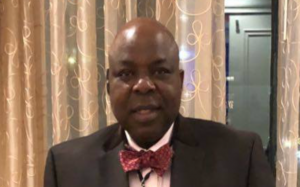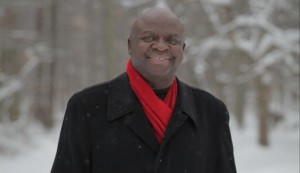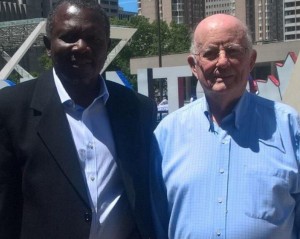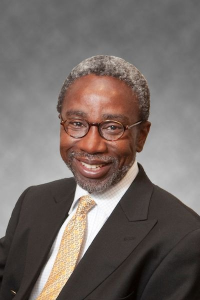It is pertinent at this time in our history and national underdevelopment to ponder a few things. Nigeria, to some, a geographical expression; to others, the indivisible nation to which we must pledge allegiance, like it or not, is, once again at crossroads. Crossroads, for many great peoples and nations are often events or periods of great national calamity that cause peoples to reimagine their future. Great peoples such as Indians and Chinese were humiliated by decades, if not centuries, of domination by Western powers, reached their crossroads in the middle of the 20th century. Chairman Mao Zedong asked himself: “In this vast land, who rules the destiny of man?” With a strong determination, he embarked on his “long march”, closed his country to foreigners for another half century, taught self-reliance, educated his people, and organized his country until his grandchildren, capitalizing on the structures he created, are now a giving the same Western powers nightmares while teaching them lessons in human capital and social development. It is an ongoing story.
India, another great nation that had also been humiliated, is not too far behind: A completely different methodology. When Prime Minister, Jawaharlal Nehru, created the Indian Institutes of technology around mid-20th century, he may not have imagined that his actions will lead to the near dominant stranglehold later Indian generations will have on the worldwide Tech Industry in our time. India has seven companies among the world’s largest 500 companies according to Forbes Fortune 500. While India is not known for being an Oil rich nation, the combined revenues of India Oil companies, listed on Forbes, is as large as half the revenues of the largest oil companies in the world! For Korea, it is about Ships and Chips! At the end of the Korean war, South Korea was devastated, hungry and desolate. Helpful western Charities kept orphanages for many homeless children. In fact, up to the early 1970s, South Korea’s electricity production capacity was lower than that of Nigeria! Today, they are not only producing 50 times per capita, the Nigerian production, they are manufacturing semiconductors, consumer electronics products, cars, and trucks in addition to their historical world leadership in heavy industries including ship building! The return of the so-called losers of the second world war: Germany, Japan, Italy, etc., whose cities were flattened by bombs, into economic winners in its aftermath is another case in point of what successful nations do when they are at crossroads.
Wrong Questions
Beginning from organizations such as MASSOB, IPOB and movements for the Yoruba Nation, centrifugal forces have been unleashed via the ineptitude and nepotism of the Buhari Government in an atmosphere of conspiracy theories on the intention of the Fulani nation that, despite their minority status, have long dominated Nigeria’s politics. The land needs healing from the armed banditry, kidnappings and killings attributed to the herdsmen of Fulani stock, Boko Haram and ISWAP all over the country. Brave Governor Ortom has been shouting from the Benue and others have simply had enough and are ready to break the nation into smaller pieces. How these will all end requires the insight of a prophet – not the kinds of prophets Nigeria is famous for – Horoscope Prophets, living and dead!
While uncertainty pervades the air, unelected Deputy President Garba Shehu has been doing what he does best: thrown a little more fuel into the raging fire by making pronouncements – insolent, to be charitable, idiotic, to be accurate, on the reason why, for example, it was necessary to attack Igboho’s house, looking for arms while ignoring the armed criminal Fulani bandits, ISWAP and Boko-Haram operatives and sympathizers, etc. that routinely kidnap northern children and take ransom money from hapless travelers nationwide! The “professionalism” of the boastful DSS operators remains AWOL when it is needed to confront the Boko Haram/ISWAP alliance that recently held “elections” in Borno State with its own “governor”, “tax” collectors, “law” enforcers and other paraphernalia of “government”! That is where Nigeria finds itself in 2021! And, of course, the situation makes people to ask questions.
Channels Television had two contrasting guests last week: Dr Hakeem Baba-Ahmed, a Fulani, and former Secretary of INEC and a vociferous “Southern stalwart” in Dr Katch Onanuju. The questions they were asked and the issues that appear to concern many in Nigeria are not about wealth creation, infrastructure, employment or competitiveness, but where the next president should come from in 2023! First of all, listening to Baba-Ahmed, I wonder why, given that such articulate Fulani people exist in this country, why is it that the ones that actually get to be president need to sometimes have their WAEC certificates presented to them after they have been head of state? If we must have a Fulani President, give me Baba-Ahmed and replace all else we have had in this land!
Of course, he did his best to feign ignorance of the attitude of Northerners in demanding the presidency after Jonathan, such is the selective amnesia and subterfuge that pervades national discourse in Nigeria. Asking the tribe of the next president, unfortunately, is the wrong question in an era of secessionist agitations, large scale insecurity, stagflation and poverty, unemployment, degeneration of public and social infrastructure, and general despondency. Baba-Ahmed asked what the demand for a Southern president would achieve. A journalist drew his attention to the fact that the ACF forgot to ask the same question when the Fulani irredentist, Professor Ango Abdulahi, made similar demands for a Northern president in 2015; a question which Baba-Ahmed masterfully dodged!
The truth is that Baba-Ahmed, cleverly advancing the Fulani agenda, asked the correct question! What is a Southern President supposed to do? (Baba-Ahmed did not ask this question about the Northern presidency in 2015.) Are we going to have a Southern equivalent of Buhari? “A president that will further alienate the North?” because to Baba-Ahmed, it is the North, not the South, that is being alienated right now! Is it supposed to be a temporary opiate for the South till another version of Buhari comes again with his own man-Friday or co-president like Garba Shehu? Suppose there is agreement for a Southerner to succeed Buhari, will that trim the wings of the forces of secession already in full flight? What happens if a Yoruba woman becomes the president in 2023? Will that, for example, stop Nnamdi Kanu from calling Nigeria a Zoo, making him and some fellow Biafran zoo-keepers the only humans in this land? By the way, let us not forget to remind him that some zoo-keepers occasionally end up in the belly of hard-to-tame tigers! Suppose we have an Igbo president, will that assuage the following of Sunday Igboho that believes that nothing short of an Oduduwa Republic will be needed to stop the humiliation of Yoruba people whose potentials have been curtailed by the heavy load of belonging to an unworkable contraption called Nigeria? Will such a president be able to mobilize Northerners against the Boko-Haram/ISWAP alternative governments that only slowed down a little when, Buhari, their spokesperson, was made President? Can the agreement for a Southern president create an atmosphere to begin to develop Nigeria? Will it make us to start talking about wealth-creation, developing local capacity to build large infrastructure projects? Move away from NNPC as a bazaar company to energy and technology companies that use modern technology and research to create energy products and whose scope is not limited to the natural resources of Nigeria alone? Work on improving the Judiciary, law enforcement and fairness for everybody before the law? More accountability: Is it true, for example, that the great railway link between Lagos and Ibadan could have been between Lagos and Maiduguri for the same amount? Will it lead to better, more competitive education for our children?
Right Questions
I have little optimism that the present regime will end well. I pray to God that I be proved wrong while trembling at the fact that I may be right! That will be a shame because, in all likelihood, we shall all pay for the errors committed by Buhari and his government one way or another. Indeed, we have started paying: We pay in hard cash at the market where the most basic food item is becoming difficult if not impossible for the average family to buy; we pay in ransom to criminal Fulani herdsmen and local copycats in the bushes around the highways; In the payments by various governments and individuals to retrieve kidnapped schoolchildren; in the disruption of society by social mobilizations for secessionist movements; in midnight visits of “professional” DSS operatives that only win their successes in unarmed civilian neighborhoods where they can kill and suffer no concomitant casualties; in the exportation of privileged youth whose parents despair of a future for their children and therefore package them overseas to start afresh in new lands where they will need another two generations to fully belong; in many other ways.
It is not likely that these will be our last payments. If we are not careful, the success (or even the failure) of the vocal secessionist movements may easily place us in the same position as Southern Sudan. Divide Nigeria to any number of parts you want, the border of the new entities will be drawn by blood. And it will be our blood (or that of our relatives); you and I – we may not be spared! Perhaps that will be noble and even necessary, for what is the need to live a useless life when there is a good death to die? Perhaps, after such bloodletting, another set of leaders, totalita alia, from what we presently have, may emerge that will allow the different peoples here (Igbos, Yoruba, Hausas, and others) to reach their potentials. They may look back and thank us for giving blood, when it was necessary, to furnish them a sense of purpose and a bright future.
The question we need to ask ourselves at this time is, whither Nigeria? Today, there is no corporate entity in the whole of Africa in the Fortune 500 wealthiest companies worldwide! Not even South Africa nor Egypt has an entry! Nigerians like to ask those of us in the universities how we rank compared to the rest of the world. Wrong question! Universities in Nigeria exist in an ambience, a system and an environment! How do the roads in Nigeria rank? How do the transportation system and motor parks in Nigeria rank? How do the sanitation system and garbage collection arrangements rank? The city transportation and danfo vans? Law enforcement, policing and the Police Stations? Health system, health financing, and the hospitals? The judiciary, their independence, fairness and courtrooms? Rental accommodation, mortgage system, or say, a typical two-bedroom flat in major and minor cities? The hygiene of food service if you want a snack on the fly? These are the corresponding questions that help to situate the answers you get. They are related!
Instead of asking where the next president will come from, let us begin by asking: President of what? Will there be a Nigeria (nation, contraption or geographical expression) to preside over? Or, if you like, to “rule” as Information Minister Lai Mohammed informed us? How will such an entity, if it survives and endures, generate the competition among its constituent elements to create better schools, more efficient industry and fairer social justice that will unleash the creative potential of its citizens? Do the people asking for secession want anything different from these? Why are we always hung up on the opiate of the tribal orientation of the leadership as if they will therefore solve our existential problems? Why is General Buhari and his Government so bent on scoring own goals by foreclosing such discussions insisting that the only changes he will accept must come form the National Assembly and that he cannot listen to those who have not won elections? Has General Buhari forgotten that in a scant six years ago, “inability to win elections” that he is so happy to denigrate now, defined him? That he relied on mass action to make his case? That he did not get any help from the national assembly?
If we break it down, in simple terms, we may ask, how will the electricity generation be tripled in the next ten years? How many local governments will be self-sufficient in infrastructure and power generation as a result of distributed power production that will therefore attract the best and brightest to itself and create wealth? How will infrastructure development companies be developed locally to challenge the tertiary institutions to supply more able products? How do we begin to measure the cost and quantity of contracts awarded in Nigeria to similar ones overseas and keep costs down to the level of our labor costs so to gain an advantage and build more things? How can we produce more doctors to the extent that they not only keep us healthy but also create a health tourism system attracting inhabitants of our region here? How do we make it more attractive to develop local environments instead of always reaching for the sharing bazaars in Abuja?
More than all this, what do we need to do today so that inhabitants of this space, 100 years from now, will consider us as worthy forbears that took them into consideration when planning at the crossroads?
